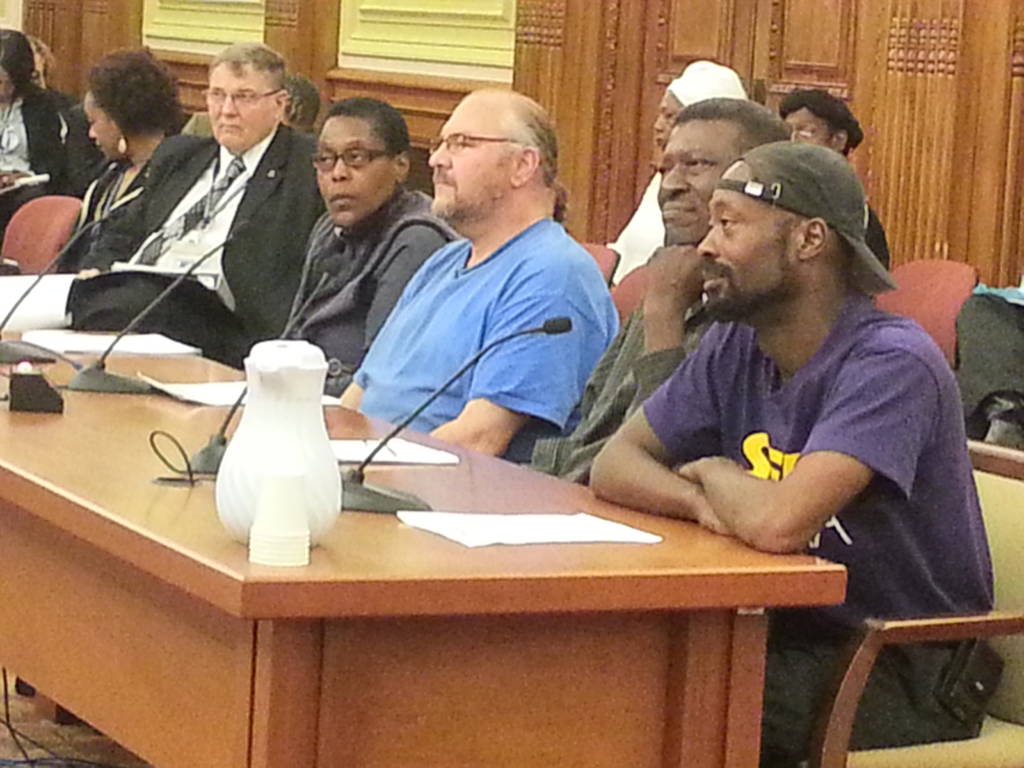Members of the homeless community, advocates and government representatives packed a June 3 hearing for their first chance to speak on proposed changes to a law that stipulates how the city provides services for its homeless residents.
The proposals, advanced by D.C. Mayor Vincent Gray, are intended to help families move more quickly from the city’s overburdened shelter system toward self-sufficiency. But the measures represent significant departures from the current law.
“We are talking about a philosophical shift or switch in our attitudes towards homelessness,” said D.C. City Councilmember Jim Graham, chair of the human services committee. “There are 92 witnesses here today, so obviously there’s a great deal of importance attached to this bill and to these amendments.”
In one of the most controversial of the proposed changes, clients in some city shelters and transitional housing programs would be required to place a portion of their incomes into savings or escrow accounts. Under another of the amendments, families refusing to accept two offers of rapid-rehousing assistance could be terminated from shelter or supportive housing programs.
In a third, shelter placements for families would be offered on a “provisional” basis only to those with no other options, such as staying with relatives or friends. Homeless parents would work with city human services staff to find alternatives to a long-term stay in a hotel or in the city’s family shelter at the former D.C. General Hospital.
The amendments were originally included in the city’s Fiscal Year 2014 Budget Support Act (BSA), which is scheduled for a vote June 18. But Graham and the rest of the human services committee voted to pull the amendments from the budget bill and consider them as separate legislation, the Homeless Services Reform Amendment Act of 2013, to allow for more opportunities for public hearings, comments and modifications.
As Street Sense went to press June 4, a spokesperson at Graham’s office said it was unclear whether the councilmember would place any of the amendments back into the BSA prior to the June 18 vote.
At the hearing on the amendments, a long list of witnesses weighed in with their concerns.
“The amendments conflict with the philosophy and programming of supportive housing, violates federal civil rights laws, and will have a substantial fiscal cost to D.C.,” said Amber Harding with the Washington Legal Clinic for the Homeless.
After several witnesses said the bill was unconstitutional, Graham said he wanted the city’s attorney general to conduct a review of the amendments to determine if civil rights violations exist in the wording.
Other who spoke expressed concerns about an amendment that would allow residents of transitional and permanent supportive housing programs to be discharged from their housing if they are incarcerated or institutionalized for 60 days or more.
“It’s perverse to pick people for a program precisely because of their history with jails, prisons, and health institutions, and then kick them out for relapsing, for needing surgery or for having a breakdown,” Harding said.
The provision requiring homeless families to deposit of money into a savings or escrow account as a condition of shelter also raised questions. The details of this requirement- if it includes earned or unearned income, and what percentage of that income must be saved- still need to be worked out, Graham said.
“We are unable to find any state that has a program similar to that which is being proposed in D.C. where contributing to escrow is a mandatory condition of remaining in a shelter,” Graham said, noting he was uncomfortable with the ambiguity of the amendment.
“We are in the forefront by proposing this, but this is not the kind of forefront I want to be in,” added Graham. He asked several supporters of the bill if they would be able to save money if his or her only income was Temporary Cash Assistance for Needy Families.
The provision that would allow shelters to terminate residents who fail to accept two separate offers for appropriate permanent housing or rapid re-housing did win words of praise, however. Under the proposal, homeless families would receive assistance paying a security deposit, first month’s rent or a temporary rental subsidy on an apartment.
In the past, however, human services officials say some families have chosen to turn down offers of rapid-rehousing, choosing instead to remain in the shelter in hopes of receiving long-term rental assistance in the form of a subsidized housing voucher.
“We do not believe that families should be able to continue to pass on good opportunities for immediate, safe, stable housing because they prefer to wait for a voucher,” said Ralph Belk, deputy executive director of The National Center for Children and Families.








